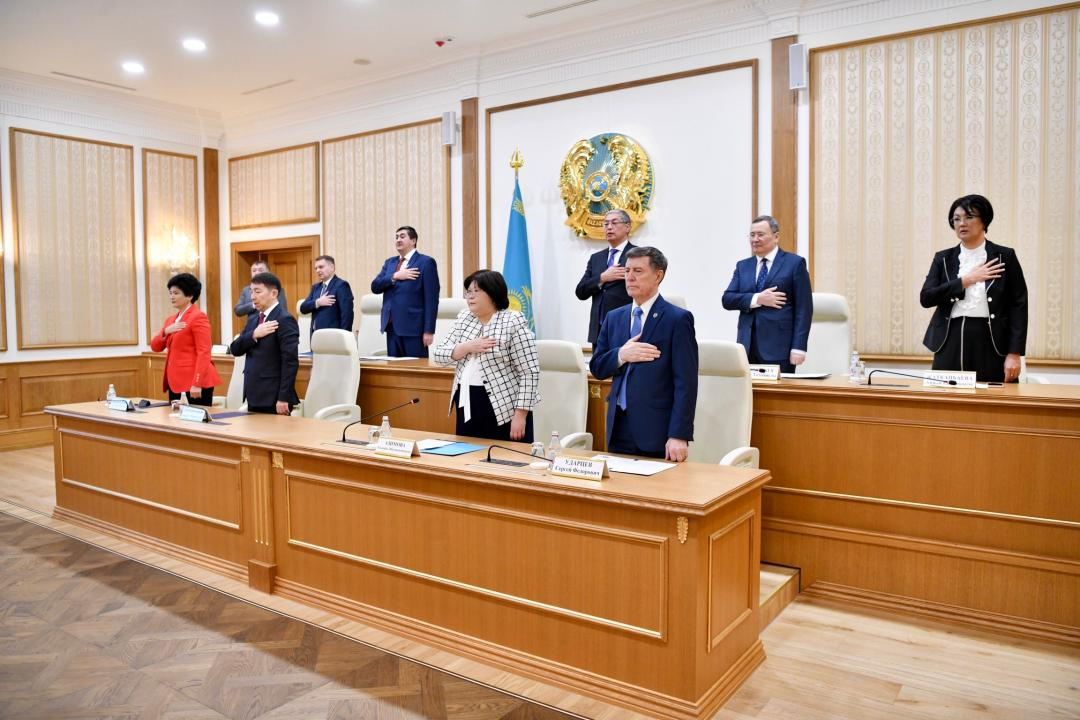ASTANA – The Constitutional Court, which began its work in Kazakhstan on Jan. 1, ruled on its first decision, repealing the law on the First President that granted Nursultan Nazarbayev exclusive rights and privileges, including retention of his and his family’s financial wealth and immunity from actions made while president and after, reports the court’s press service.

Judges of the Constitutional Court taking an oath. Photo credit: press service of Constitutional Court.
The appeal came from a group of deputies on Jan. 5, who questioned an official interpretation of Article 62 of the Kazakh Constitution, which states that “constitutional laws are passed on matters provided for in the Constitution by a majority of at least two-thirds of the total number of deputies in each chamber.”
Their concern was whether the constitutional law on the First President can be recognized as valid after last year’s referendum excluded the norms from the Constitution governing the status and powers of the First President.
“Based on will of the people of Kazakhstan, expressed at the national referendum of June 5, 2022, on exclusion of paragraph 4 of Article 46 and other norms from Constitution of the Kazakhstan, to recognize, that at present time in Constitution of Kazakhstan there are no legal grounds for preservation of constitutional law on First President of Kazakhstan – Elbasy in acting law of Kazakhstan, in connection with that it is subject to recognition as invalid,” reads the court’s final decision.
The decision comes just a few weeks after the Mazhilis, a lower chamber of the Kazakh Parliament, started working on the draft law to declare the law on the First President invalid.
The re-emergence of the court, which has existed in Kazakhstan between 1993 and 1995, is an initiative voiced by President Kassym-Jomart Tokayev in his address to the nation on March 16, 2022 and was voted for at the national referendum on June 5, 2022.
It reconvened with a strong mandate to boost the protection of fundamental rights and freedoms in the country by giving a chance to citizens to appeal directly to the court. Besides the citizens themselves, the Human Rights Ombudsperson and the Prosecutor General can also appeal directly to the court.
The court consists of 11 judges – six appointed by the Parliament (three judges each by the Mazhilis and the Senate), and four judges are appointed by the President. The chairperson of the court is appointed by the President with the consent of the Senate.
Elvira Azimova, a former human rights commissioner and deputy minister of justice, was unanimously approved as the court’s chairperson at a Dec. 29 meeting of the Senate after Tokayev proposed her candidacy. Tokayev also appointed Kairat Zhakipbayev, Aizhan Zhatkanbayeva, Bakyt Nurmukhanov and Roman Podoprigora.
The Kazakh Parliament, in turn, endorsed Aigul Kydyrbayeva, Asan Eskendirov, Yerlan Sarsembayev, a former Minister of Justice Kanat Musin, Yerkin Ongarbayev and Sergey Udartsev as constitutional court judges.
